In the past, many people would expect to undertake the same job for the whole of their working lives. However, today it is widely recognised that individuals will be involved in a process of lifelong learning and career development throughout their working life. This may involve making changes to their chosen career path as well as taking on more responsibility.

British Gas is a British-owned energy supplier. It is part of Centrica. It is a top 30 FTSE100 company with energy businesses in the UK and North America. British Gas is the UK’s leading provider of energy and has over 16 million customer accounts. British Gas employs over 20,000 people and was voted one of the ‘25 Best Big Companies to Work For’ by The Sunday Times in the UK in 2011.
Investing in employees
British Gas understands the importance of investing in its employees. Training employees is the cornerstone of developing the business. Its open and honest culture, based on trust and respect, creates a sense of community. British Gas focuses on building a diverse workforce where employees can fulfil their potential and be rewarded fairly for their efforts.
Valuing diversity or difference provides a business with many benefits, for example, being able to draw on the widest pool of talent. It also enables a business to closely reflect its customers’ needs. British Gas does this by having female engineers available to respond to its female customers in their homes.
This case study shows how British Gas develops the roles and responsibilities of its employees at different levels. In doing so, it illustrates how individuals are able to develop a career that reflects and rewards their potential. It shows the variety of career paths available within British Gas, the structures that employees work within and the levels of responsibility for each role.
It also highlights how British Gas needs employees with a wide range of skills and abilities. Roles within British Gas range from engineering to marketing, accounting to IT as well as those involved in customer service.
Organisational structure
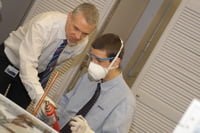
Having the appropriate structure is vital for an organisation or business to meet its aims and objectives. A business may be structured by:
- functions – activities such as customer service, marketing, operations, finance or IT
- location – where regional divisions of the business take responsibility for a specific function or particular products, whether locally, nationally or internationally
- product or services – where the business is divided into the particular products made or services provided.
All organisations have employees working at different levels of responsibility. At the bottom, a business depends on its operatives to produce the products or services. Team leaders often perform the day-to-day management role, with operational managers setting direction and strategy for the business as a whole. The number of employees in each level will depend on the business’ organisational structure.
Hierarchical structure
Large organisations, like British Gas, tend to have tall (or hierarchical) structures. A tall structure will have many different levels of employees all reporting upwards to team leaders and then up to operational management. It will have a wide chain of command with a narrow span of control. The chain of command refers to the number of levels within an organisation. The span of control is the number of employees who are directly supervised by one person.
A tall structure can often lead to slower communication channels and decision-making. British Gas divides its business activities by products (gas and electricity), by services (maintenance and repairs) and also by functions, for example, customer services.
Flat structure

A flat organisational structure has fewer layers of management and wider spans of control. This means operatives can access and communicate with managers more easily and quickly. This relies on workers taking more responsibility for decision-making. This can create a more motivated workforce. This type of structure is often seen in newly set-up or smaller businesses.
A benefit of this structure is that it allows the business to change rapidly to respond to the market, customers or competitors. However, this only applies if the staff are well trained and capable of making effective responses.
Matrix structure
A matrix structure pulls together employees who combine the relevant product and functional expertise in order for the business to meet its goals. The people selected come from different levels and departments within the business. This structure can be used in both hierarchical and flat organisations.
Matrix structures are frequently used for specific projects. Individual team members may come from different parts of the business, regardless of their location. Once a project is completed, the matrix will be disbanded and a new structure set up appropriate for the next project.
Roles and responsibilities
At operative level within British Gas there are hundreds of apprentice engineers taken on each year. It also offers many places through its graduate development programme. The apprentice role is often the point of entry to British Gas. An apprentice has an operational role and will therefore appear at the lower level of the British Gas hierarchy. Apprentices need a minimum of 4 GCSEs at grade C or above or equivalent. The minimum age for a British Gas apprentice is 16 years old.
An apprentice engineer is responsible, amongst other things, for:
- the annual service of a customer’s central heating system and its maintenance
- control, design and installation of central heating system upgrades to improve efficiency and flexibility.
Apprentices and trainees need a variety of skills. They need to plan and prioritise workloads, solve problems and act upon sales opportunities. Customer service skills are also very important. Apprentices and trainees report into a service manager.
Training
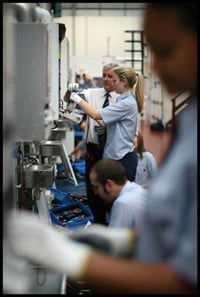
Maria is a trainee electrical field engineer. British Gas provides her with a challenging work environment that enables her to get to grips with real life situations. The British Gas training programme has taught her many transferable skills as well as valuable hands-on experience. She has found British Gas to be a positive and diverse place to work.
Maria’s job involves installing and maintaining domestic electrical equipment as well as performing inspections to ensure existing equipment is safe. The training programme is vital given the dangers involved with faulty installation or damaged equipment.
British Gas apprentices and trainees receive some of the best training in its sector. The apprenticeship involves block-release training at award-winning training centres. They also work with a qualified mentor who works in the field.
Technical Service Engineers work towards NVQ Level 3 qualifications. These are continually assessed by assessors both in the training centres and in real jobs on customers’ premises. This gives the trainees valuable on-the-job training and eliminates the need for final exams. Coaching and support is a key element of this training.
Management
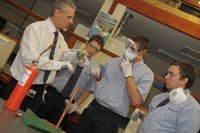
Theorist Henri Fayol identified a good system to help managers work effectively. Fayol proposed that the five key functions of management are:
- planning
- organising
- commanding
- co-ordinating
- controlling.
Within British Gas, each individual operates as a member of a team. The head of a team is a team manager who has a range of supervisory duties. These include monitoring the performance oftheir team members.
At British Gas the team managers are referred to as service managers. Service managers are well-skilled and motivated individuals. As managers, they need a range of knowledge and understanding of job roles within their teams. They also require an understanding of the strategies that could be used to identify solutions to meet customers’ needs.
Manager skills
Service managers of electrical and technical service engineers need to organise routines in order to meet the needs of customers. They must also positively promote British Gas and its products. Their expert knowledge helps them to provide customers with sound advice that opens up opportunities to create new business. Occasionally, they have to deal with customer complaints. This is why customer service and good communication skills are of great importance to this role.
As leaders of a team, all service managers within British Gas set personal and group targets for employees within their span of control. They also communicate their ideas and thoughts to members of the team, to other service managers and to operational managers. At all times they need to maintain good working relationships with team members. Being able to communicate effectively and keep focused on strong customer relations helps them to manage their workload effectively.
Some of the benefits of being a service manager include:
- a competitive salary
- performance-related bonuses
- good pension provision.
Developing skills
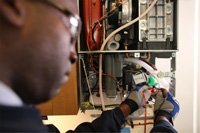
In many cases an individual who started at British Gas as an apprentice, trainee or qualified engineer or electrician can advance to become a service manager. Career progression may eventually enable them to become a operational manager. Operational managers have more responsibilities than the service managers. As such, the operational managers are responsible for making strategic decisions.
To make such decisions operational managers require a range of key skills. These include skills and knowledge of customer service, teamwork, communication, IT and finance.
Progressing within the business
As individuals progress from a service manager to operational managers within British Gas they need to up-skill. This helps them to adapt and develop as they undertake further senior responsibilities within the organisation. For example, they now have to take responsibility for customer satisfaction for a large part of the business. They do this by monitoring that work has been completed to the satisfaction of customers. Health and safety is an important part of this role.
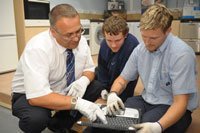
Operational managers also have to monitor standards and set targets for improvements. They are responsible for managing budgets and have to ensure that their part of the business meet its budget objectives. At all times they must try to improve best practice. By doing this they can identify areas where costs can be reduced to improve profitability and efficiency.
It is the vision of the operational managers that keeps the business moving forward, vital in such a highly competitive market. Decisions made by the operational managers are passed down the hierarchy to the service managers. Service managers must then communicate the messages to the operatives.

British Gas is structured in a way that focuses its activities around its customers’ needs. The organisation has divided its operations into a range of business units each with employees at a variety of different levels.
Operatives focus on providing front-line skills and meeting the immediate needs of customers. They work as a member of a team and are supervised by a service manager to whom they regularly report. Operational managers are responsible for managing a number of teams in order to deal with the strategic objectives of the business, especially to provide the highest quality service expertise in the UK.
Employing a diverse group of people is very important within British Gas, as is the process of engaging with employees. This enables them to contribute to the decision making process.
This case study illustrates how, within a large business organisation, a pathway can be created that provides career development through a process of lifelong learning.



